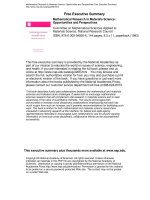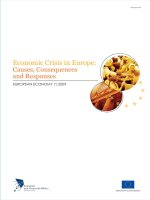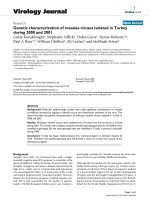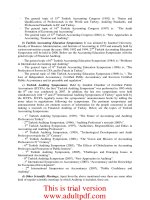FINANCIAL AUDITING IN TURKEY: HISTORICAL CONTEXT AND EXPECTATIONS_part1 pptx
Bạn đang xem bản rút gọn của tài liệu. Xem và tải ngay bản đầy đủ của tài liệu tại đây (124.96 KB, 10 trang )
1
FINANCIAL AUDITING IN TURKEY:
HISTORICAL CONTEXT AND EXPECTATIONS
Associate Professor Şaban UZAY
*
Research Assistant Ahmet TANÇ
**
Mehmet ERCİYES, CPA
***
“We perceive accounting, financial reporting, and auditing as factors of physical infrastructure and
as special aspects of economic development of a country”
World Bank Representative in Turkey, Frederick Temple, January 12, 1994.
Abstract
Objectives of this study are: a) To analyze the historical development of financial auditing in Turkey
with a special stress on practice, professional organization, and education. b) To both provide
information about the current status of financial auditing in Turkey and make further assessment. First
financial-auditing practices, education, and professional organization that lay the basis for legal
regulations have been analyzed. The Case of Ariş A.Ş. is given as an example for the first financial-
auditing practices. Toward this end, we conducted an interview with Prof. Dr. Mustafa Aysan.
Moreover, the current situation of financial auditing in Turkey is detailed; and the impact of some
national and international developments on auditing environment in Turkey is discussed. Some further
assessments are included at the end of the study.
Keywords: Financial Auditing in Turkey, Sample Practices, Education, Professional Organization
Article Outline
1. Introduction
2. Financial-Auditing Practices
2.1. Historical Development of Auditing
2.2. First Practices in Turkey
2.3. The Case of Ariş A.Ş.
3. Professional Organization
4. Education
4.1. Courses
4.2. Published Articles, Announcements, Books, Theses and Special Reports
4.3. Congresses, Symposiums and Conferences
5. The Profession’s Today and Future
5.1. Challenges in the Sector and Solutions
5.2. Developments Having an Influence Financial Auditing in Turkey
5.3. Further Assessments and Result
1. Introduction
Accounting and auditing are two mutually interrelated concepts. Auditing wouldn’t exist
without accounting correspondingly accounting would be nothing without auditing in that
auditing entails accounting (Güvemli, 2001: 625). Auditing without accounting is groundless
and accounting wouldn’t be safe without auditing. In almost all countries auditing is a
superior notion which precedes accounting (Yazıcı, 1986: 9).
*
Erciyes University, Faculty of Economics and Administrative Sciences, Department of Business,
Kayseri/Turkey (E-mail: )
**
Nevşehir University, Faculty of Economics and Administrative Sciences, Department of Business,
Nevşehir/Turkey (E-mail: )
***
Chamber of Certified Public Accountants of Kayseri; Erciyes University, Institute of Social Science,
Department of Business, Ph.D. Student, Kayseri/Turkey (E-mail: )
This is trial version
www.adultpdf.com
2
Financial auditing, which raises the reliability of accounting information by examining the
compliance of financial statements to accounting standards pursuant to auditing standards, is
an integral part of economical system in developed and developing countries. Reports
rendered by auditors take notice from all stakeholders which are in need of reliable
information particularly from capital market investors. Financial auditing developed in
correspondence with economic developments in Turkey. The first practices of financial
auditing came with the assignment of court experts in courts and allocation of tax audit
authority in accordance with the pertinent tax laws. Subsequently, the professionals of this
field have become organized by themselves, establishing the legal status of the profession and
raising a consciousness of accounting and auditing within the society by means of training
facilities and activities.
Objectives of this study are to: a) Analyze historical development of financial auditing in
Turkey with regards to practice, professional organization and training point of views. b)
Provide information about the current condition of financial auditing in Turkey and make
forward-looking statements. First practices of financial auditing, which lay the basis for legal
regulations rather than legal development of financial auditing, professional organization and
education scopes of the profession will be analyzed rather than legal development of financial
auditing.
2. Financial Auditing Practices
In this part first practices of financial auditing will be scrutinized after a brief summary of
Historical Development of Financial auditing in Turkey and the world in general.
2.1. Historical Development of Auditing
The term auditor was first used in the year 1289. The first professional organization of
auditors was founded in Venice in 1581. Financial auditing gained prominence in the early
19
th
centuries in Britain (Arkun, 1980: 19). In Britain, auditing became compulsory for
companies with limited liability companies by the law put into force in 1900. William
Deloitte established Deloitte & Touch, still in service today, in London in 1845 (Yıldırım et
Al., 1995: 149). The legal status for the profession was granted in New York in 1896 and
other states followed the same process in the U.S. The first financial statement to be audited
by Certified Public Accountants (CPA) was published in 1901 in the U.S. (Ferman, 1974: 88).
Today’s independent audit approach was first put applied in 1930’s in the U.S. AICPA’s
(American Institute of Certified Public Accountants) pronouncement of “Examination of
Financial Statement by Independent Public Accountants” was published in 1936. Securities
Exchange Act, put into force in the USA in 1934, entailed that public companies publish their
audited financial statements periodically, assuring the prominence of independent auditing
(Pirgaip, 2004).
The profession of auditing has its second longest history in Germany after Britain. The
audit function was put into practice in France with “Companies Charter” law in 1867.
Pursuant to this law all publicly-owned corporations’ accounts had to be audited by one or
more account controller. Essential qualifications for auditors were specified and the scope of
auditing was extended in subsequent laws. Accounting and auditing functions were separated
with a governmental decree in France in 1966. An association was founded to organize
independent auditing in 1988 (Yıldırım et Al., 1995: 168-261). “The Profession of Sworn-in
Accountancy” obtained a legal status in 1955 in Greece (SPK, 1985: 232). Regulatory
organizations in Turkish financial system became involved in the concept of independent
auditing parallel with the development of financial markets by 1987.
This is trial version
www.adultpdf.com
3
There have been some changes within the process of historical development of financial
auditing in approaches to financial auditing and in the sides getting involved with it. In the
early years only company owners were involved in auditing, however, the number of
concerned parties such as lenders, government, capital market investors increased in the
course of time (Güredin, 2007: 16). The historical development of auditing approaches can be
outlined as below (Bozkurt, 1998: 17-18):
- “Document Audit Approach”, which entails that the whole document be analyzed, was
implemented in former and subsequent periods of industrial revolution until the
1900’s,
- During the years between 1900-1930 “Financial Statement Auditing Approach”,
claiming that the financial statement be examined as a whole.
- “Systems Based-Audit Approach” requiring that internal control structure within
enterprises be examined, valid from 1930’s to today,
- As a result of improvements in information technologies and in the field of auditing
and wide-spreading of operational auditing, “Management Auditing Approach”,
- “Risk-Based Audit Approach” was implemented as a result of large scale financial
scandals that had emerged after the 2000’s.
2.2. First Practices in Turkey
During the Ottoman era accounting system was an integral part of government financial
management. Therefore auditing had the quality of financial auditing (public audit), and was
implemented to monitor government’s income and expenses. The Ministry of Finance
Inspection Board, still in force today, was established in 1879 (Güvemli, 2001: 640). Ottoman
Foreign Debts Administration (Düyun-u Umumiye İdaresi) supplied the need for accountants
in the market and raised new teachers in the field of accounting education (Aysan et Al.,
1998: 65).
Profession of financial auditing started with expertise practices in courts and in the period
between 1926-1934 tax auditing authority was given to well known accountants pursuant to
the tax codes in Turkey. This was followed by both the processes of legalization and
professional organization (Türker, 2006: 5).
Global economic crisis in 1929 had some bad impacts on Turkish economy as well. A
need for accountants and accounting units in the enterprises emerged as result of rapidly
changing economical structure and developments in industrialization particularly after the
1950’s in Turkey. These developments also brought up the necessity of an accounting
education. Conversely accounting systems were used with a limited scope in the family
companies, established in the wake of private entrepreneurship, to inform not the public but
just companies. Consequently there was no need for independent audit during those years
(Gücenme and Arsoy, 2006: 310).
Independent audits in the European Sense started to be implemented in Public Economic
Enterprises. Additionally, the audits performed by inspection staff in the Ministry of Finance
and by sworn-in comptrollers in banks may be given as special purpose audit samples (SPK,
1985: 30). There were independent audits performed by state organs in incorporated
companies (Pursuant to TCC and Constitution for Auditing Of Incorporated Companies And
Constitution For Inspection Board dated 1972) and external audits performed by the “Audit
Board”, an audit unit mentioned in TCC before the legal regulation of independent audit in
Turkey (Gücenme and Arsoy, 2006: 315).
This is trial version
www.adultpdf.com
4
The first step in financial audit in Turkey was taken when Turkish companies demanding
to benefit from foreign credit sources were obliged to employ financial audits in 1970’s. In
the following years consultancy was needed in the form of financial auditing occurred in
correspondence with the rapid growth of foreign currency flow, consolidation for company
centers with foreign currency, international finance facilities, tax laws, TCC, application to
General Directorate of Foreign Investment, investment promotion and business combination.
Arthur Andersen opened an office in 1975 and Arthur Young opened one in 1983 in
Istanbul. In 1982, international “Coopers and Lybrand” company and Güven Muhasebe ve
Vergi Müşavirliği Bürosu merged under the name “Güven ve Coopers and Lybrand A.Ş.”
(SPK, 1985: 93-103). PricewaterhouseCoopers has been giving service in Turkey since 1981.
While the legal basis of financial audits dates back to 1933’s in Turkey, first rules were
made for banks and subsequently for the capital market. As a result of the regulations put
forth in 1987, the number of authorized independent auditors rose up to 35. Of the 35, 8 were
international audit companies, 27 were domestic audit companies (Uzay, 1990: 61).
In a research dated early 1989’s the below table was created displaying the status of audit
firms in Turkey:
Table 1. Audit Companies’ Revenues and Field of Activities in Turkey(1989)
No
Audit Company Name
Income
(Millions TL)
Wage Dist
ribution
(%)
Staff Distribution
(%)
Audit Tax Consultancy
Audit Tax Consultancy
1
Arthur Andersen
2.941
54
28
18
60
10
18
2
Price Waterhouse
2.500
80
20
0
77
(*)
3
Güven ve Coopers & Lybrand
1.697
32
11
57
17
3
11
4
Denet Touche Ross
1.378
39
61
(
*)
30
2
2
5
Deloitte
Haskins
& Sells
967
75
20
5
33
3
5
6
Arthur Young
950
85
10
5
37
(*)
7
Denge
Denetim
340
39
39
22
10
4
9
8
Moore Stephens
(*)
80
20
0
13
1
9
BDO Binder Baylan
217
53
47
0
14
(*)
10
Vega
Denetim
100+
95
2
3
16
(*)
11
Cevdet S
uner (KPMG)
(*)
(*)
(*)
(*)
15
(*)
12
Kavram
97
45
34
21
4
2
1
13
DFK International
Denetim
Finans Kontrol
96
85
10
0
7
1
0
14
Özgür
Denetim
23
(*)
16
0
1
15
D & D
Denetim
(*)
15
3
5
16
Kural
Denetim
(*)
19
(*)
17
İkden
Denetim
(*)
(*)
(*) No information obtained
Source: European Accounting Focus, 1989: 5
Having witnessed the development of auditing profession in Turkey and deeply interested
in professional practices, organization and education of auditing, Prof Dr. Mustafa Aysan,
stated his below considerations and assessments pertinent to the development of the
profession in the interview
1
. The notes taken from the interview with Aysan are included and
evaluated in some parts of this study. This part represents his own statements pertinent to Ariş
A.Ş., a company performing financial audits, which was established by him and his friends,
and professional developments of the time.
2.3. The Case of Ariş A.Ş.
1
The interview in Finansbank General Directorate-Istanbul on Nov 16, 2007.
This is trial version
www.adultpdf.com
5
“System consultancy was formerly employed in Turkey. Verification process was used in
subsequent periods. Our friends in the real sector were well aware of this. There was a
crucial need for such organizations as Expert Accountants’ Association of Turkey-EAAT.
A theoretical and practical description had to be made for it. We highlighted auditing on
accounting congresses. I have actively participated in three congresses to point out the
importance of this profession to the country. Then I invited a president candidate for
IFAC two times to Turkey and had him mention about this profession. I made R. Seatler, a
lecturer in Boğaziçi University at that time, give a series of conferences. We incessantly
gave lots of proposals to the state for a pertinent law. After the 1960’s foreign companies
started to make investments in Turkey. The requirement for an independent audit
appeared in accordance with the parent of the foreign companies. Turkish companies
were in need of a similar assurance in order to obtain credits and loans from foreign
banks. In the early 1960’s an English accountant, named Newberry, opened an office in
Taksim, Istanbul. He brought several experts with him for this aim. The number of staff
working in his office increased up to 50. Then, he went to Germany. When Newberry’s
office closed, our company, Ariş Şirketi, established in 1970, started to perform annual
financial audits for the Türk Dış Ticaret Bankası. This company was established by 40
accountants to provide auditing services. We established this company with the affiliation
of a financial audit company in New York. Our objectives are to; pioneer in the field and
aggregate accountants under such an organization. Our company continued its services
for about 10 years however, nobody took the risks because they all were doing their own
businesses. We wanted to establish and run a company in the form of association, but we
couldn’t succeed. We transferred Ariş to İsmail Otar and his friends. They also liquidated
the company after a while. Today there are no domestic audit companies giving service
independently. All of them are depended upon a foreign audit company. Some of our
friends were widely-recognized in Europe 25-30 years ago. We can’t encounter such
individuals today. We don’t have such companies giving service to foreign banks.
Conversely, we should have lots of audit companies. There are definitions for small scale
enterprises in the draft of Turkish Commercial Code, and it significantly contributed to
the profession. It mentions about independent auditing specialization and our two vital
requirements have so far been 1) Financial report disclosure principles and, 2) good
experts”.
3. Professional Organization
Prof. Dr. Mustafa AYSAN’s considerations and assessments on professional organization
and education are as follows:
“Financial auditing” has been restructured in accordance with market requirements.
However, there have been ongoing organization efforts since 1930’s. In 1942, Association
of Expert Accountants and Business Organizers (Eksper Muhasipler ve İşletme
Organizatörleri Derneği) was established with 100 members. İsmail Otar and Osman
Fikret Arkun are among the founders of the association. They called me and I spoke to
them and became a member of the association for which I have been working for a long
time. The above mentioned association was involved in the arrangement of accounting
congresses which started in 1956. Each year a school of accounting has been responsible
for holding the congresses. In the year 1956-57 Ankara University Faculty of Political
Sciences held the first congress. I have been directly involved in the 3
rd
congress held in
1959. Conditional grants were obtained from the USAID (The United States Agency for
International Development). The USAID suggested that an association be founded for the
sustainability of grants. In view of this, we changed the name of the association as
“Expert Accountants’ Association of Turkey (EAAT)”. I recommended using the term
This is trial version
www.adultpdf.com
6
‘expert accountants’ which was then accepted. The EAAT has been providing service after
the establishment of TÜRMOB (The Union of Certified Public Accountants and Sworn-in
Certified Public Accountants of Turkey) as well. According to me the EAAT, means
consciousnesses. Such an Association is essential for researches. The EAAT, publishes
“The Journal of Accounting (Muhasebe Dergisi)”, and supports accounting congresses.
Osman Fikret Arkun, İsmail Otar and I attend the World Congress of Accountants in 1972
with twenty companions. It was in that congress that the foundation of the IASB was
decided. In The Eleventh World Congress of Accountants in Munich 5 years later it was
decided to found IFAC as well. This decision was taken with approval and signature of
117 countries. I have also signed this decision on behalf of EAAT. In 1970’s we initiated
“Accounting Education Symposiums” with the grant to “Association of Coordination and
Management (Sevk ve İdare Derneği)”. Our objective was to promote accounting
education in Turkey. The department of “Financial Auditing” was established in Istanbul
University Faculty of Business Administration in 1968 in pursuant to my proposal. We
opened Master’s Program in Auditing in 1981-1982 educational year in the Institute of
Accountancy”.
Below are the professional organizations founded by the professionals interested in
financial auditing in Turkey all of which are still in service today, but one:
a) Association of Accountants and Comptrollers (Muhasebeciler ve Murakıplar
Cemiyeti): It was founded in 1935 in Istanbul and was closed after a short period (Yazıcı,
1986: 65).
b) The Expert Accountants’ Association of Turkey-EAAT (Türkiye Muhasebe
Uzmanları Derneği): The EAAT was founded in 1942 by 14 individuals. Its objectives
are listed as follows in its bylaws (Güvemli, 2001: 695) to; “Raise licensed accounting
staff for various units in all fields in of private and public sector in Turkey, promote the
capacity and quality of existing accountants and ensure that their knowledge is utilized
effectively in management and examinations, organize and promote the accounting
profession, ensure that its members are culturally, socially and economically developed
and protect their rights and benefits”.
There has been a substantial shift in the status of association thus increasing the number of
its members from 100 to 1300 today. “Accounting Magazine (Muhasebe Mecmuası)”,
which was first published by the association on September 10, 1958 and its name was
changed as “The Journal of Accounting (Muhasebe Dergisi)” and announcements made in
accounting congresses were published in this journal till 1967 (www.tmud.org.tr).
c) The Association of Financial Counselors and Accountants (Mali Müşavirler ve
Muhasebeciler Derneği): Founded in 1977 in Istanbul, its current name is The Union of
Financial Counselors and Accountants (Mali Müşavir ve Muhasebeciler Birliği). It has
totally 28 branches/representatives in 10 cities (www.mmmb.org.tr).
d) The Association of Independent Auditing (Bağımsız Denetim Derneği): After it was
made necessary for companies under the banks and capital market to employ auditing
activities in their premises in 1987, 19 national and foreign auditing companies were
registered. These companies aggregated to form the Association (Türker, 2006: 6). The
association forms the broadest platform on which the issues and affairs of auditing
profession are negotiated and its objectives may be listed as below (Bağımsız Denetim
Derneği, 2004: 6);
“It gives service in many fields ranging from; developing and dealing with the
profession of auditing rather than public authority and in this context training its
This is trial version
www.adultpdf.com
7
members, introducing and promoting auditing, representing its members in front of
national and foreign professional organizations and authorities to providing solutions
for the common problems of its members and establishing a strong collaboration
among them”.
Capital Markets Board of Turkey encouraged and supported the foundation of association.
After the foundation of TÜRMOB as a professional organization in 1989, some discussions
were made as to whether activities of the association were ceased or not. However, there
seemed to be a need for a platform for independent auditing practices thus it was decided that
the association should continue giving service. Today, the Association provides technical
expertise on auditing, solutions for its nearly 100 members’ common problems, forward-
looking assessments about future and monitor global developments (Coşkun, 2006: 2).
e) The Union of Certified Public Accountants and Sworn-in Certified Public
Accountants of Turkey (Türkiye Serbest Muhasebeci Mali Müşavirler ve Yeminli Mali
Müşavirler Odaları Birliği-TÜRMOB): Founded in accordance with Law No: 3568,
published and put into force in 1989, the union is the top level professional organization
of Independent Accountant, CPA and Sworn-in CPA’s in Turkey. The union has
supported the development of profession in Turkey with regulations, committees and
congresses since 1989. The colleagues must become a member of chamber under
TÜRMOB. In the beginning of 2008 there were totally 70.000 professionals in 70
chambers under TÜRMOB. Of the 70.000, about 30.000 were a member of Independent
Accountants, 40.000 of CPA. Furthermore, there are 3.673 Sworn-in CPAs registered as a
member of 8 Sworn-in CPA chambers under TÜRMOB (www.turmob.org.tr).
4. Education
İsmail Otar’s, accounting historian, announcements about the emergence of accounting
education as a profession in Turkey are as follows; accounting books between period of
Tanzimat in Ottoman (Reorganizations and political reforms made in the Ottoman state in
1839) and 1928 were translations from French. German genre was dominant in both practice
(in Public Economic Enterprises) and education from the first years of republican era to
1950’s (Aysan et Al., 1998: 65-68). Auditing education started to be provided in Istanbul
University Faculty of Business Administration, founded in 1968, in accordance with auditing
standards issued by AICPA. This education was further continued with Master’s Program of
“Accounting Expertise” in the late 1970’s (Türker, 2006: 6).
According to Masum Türker the courses conducted under the title “Control and Revision”
after the 1940’s was further changed as “Audit and Revision” and finally “Financial
Auditing” (Türker, 2006: 6). In his book’s, named “Financial Auditing” and dated 1975
January, foreword Prof. Dr. Osman Fikret Arkun says; “I see that it will be useful to gather all
experiences I had in those ten years in the field and my education experiences in Istanbul
Economic and Commercial Sciences Academy” (Arkun, 1980: 8).
Istanbul University Faculty of Business Administration lecturer Prof. Dr. Ersin Güredin
stated that; At first “Business Auditing” course was incorporated in the curriculum of 3
rd
year
classes in 1968 and then “Financial Auditing” course was integrated into the program for last
classes as well”. Prof. Dr. Ersin Güredin published his course book titled “Auditing” in 1981
for the first time.
The education of Financial Accounting in Turkey will be analyzed below under the
headings of courses, publications and scientific meetings. Courses and publications are related
with raising auditor candidates and scientific meetings are particularly related with
professional improvement
This is trial version
www.adultpdf.com
8
4.1. Courses
In Turkey, there are no educational institutions providing education in the mere field of
accounting and auditing. Accounting and auditing courses exist in the curriculum of
Economic and Administrative Sciences Faculties and Faculties of Business Administration or
Economics among other courses. There are “Accounting Programs” in Vocational Schools of
Social Sciences in pre-graduate program level, and the graduates of this program have no
legal right to be a Financial Auditor. This is because Law No. 3568, which establishes the
legal status of accounting and auditing professions in Turkey, entails that people to deal with
auditing must have a CPA or Sworn-in CPA titles (namely, they must have a bachelor’s
degree at least) (Law No. 3568, Article 2).
Gücenme and Arsoy (2006), made a survey on accounting courses in the bachelor’s
programs of 60 universities in Turkey and found that one of the mostly (75 percent)
conducted courses in bachelor’s degree education programs is the course for financial
auditing. In 49 universities the rate of financial auditing courses in Master’s programs
accounts for 43 percent while in the same rate has been determined as 33 percent for doctorate
programs of totally 21 universities.
There are post-graduate programs in most of the universities of Turkey in the field of
Accounting and Finance (in some universities Accounting and Accounting/finance field of
study) in master’s degree level, (thesis, non-thesis) and doctorate degree under the framework
of Institute of Social Sciences. Educational programs which have “Financial Auditing”
courses in their syllabus are listed by analyzing web sites of universities and presented in
Table 2.
Table2. Universities with Financial Audit courses in their Post-Graduate Programs
University Master’s Degree Doctorate Degree
Marmara
University
(Financial Auditing)
-
Audit
ing
Theory
-Accounting and Auditing Standards
-Capital Market Board of Turkey and
Auditing Practices
-Internal Control in Enterprises
-Cost Auditing
-Internal Auditing
-Computer Assisted Audit Techniques
-Fraud Auditing
-Tax Auditing
-Operational Auditing
İstanbul Ticaret
University
(Accounting-Auditing)
-
Audit
ing
Theory and International
Auditing Standards (Z)
-Internal Control Systems (Z)
Bilgi
University
(Accounting-Auditing)
-
Audit
ing
Theory
(Z)
-Standards of Auditing (Z)
-Internal Auditing (Z)
Başk
ent
University
-
Financial Auditing
(S)
International
Audit
ing
Standards
(S)
Marmara
University
(Accounting-Finance)
-
Financial Auditing
Practices
(Z)
International
Audit
ing
Standards
(Z)
İstanbul
University
-
Audit
ing
Principles and Techniques
-
Advanced
Audit
ing
-Advanced Auditing Practices
Akdeniz
University
-
Financial
Audit
ing
(S)
External Audit
ing
and Audit
ing
Standards (S)
Anadolu
University
-
Audit
ing
Standards
(S)
-Internal Control (S)
-
Audit
ing in
Computerized
Systems
(Z)
-Internal Auditing (Z)
B
al
ıkesir
University
-
Advanced
Audit
ing
(S)
This is trial version
www.adultpdf.com
9
-
Advanced
Audit
ing
Practices
(S)
- Operational Auditing (S)
Celal Bayar
University
Control
and
Audit
ing
Practices
(Z)
Çukurova
University
Audit
ing
(S)
-
Advanced
Audit
ing
Techniques
-National and International Standards
of Auditing
Dokuz Eylül
University
Audit
ing
(Z)
Erciyes
University
-
Independent
Audit
ing
Standards
and
Practices (S)
Abant İzzet Baysal
University
Financial
Audit
ing
(Z)
Afyon Kocatepe
University
Internal
Audit
ing
Gazi
University
Financ
ial
Audit
ing
(Z)
Independent
Audit
ing
(Z)
(Z) Required course; (S) Elective course
As it seen in Table 2, there are some courses for financial auditing in the Departments of
Business Administration under different course titles in many universities including leading
universities of Turkey. The fact that there are some courses under the titles of internal
auditing, internal control and operational auditing along with financial auditing courses are
promising developments for the profession of financial auditing. On the other hand, Istanbul
Ticaret University and Bilgi University’s opened a Master’s Program under the title of
“Accounting–Auditing” and Marmara University under the title of “Financial Auditing”,
which would mean more experienced and equipped candidates for auditing profession. In this
context, the aim of Marmara University Financial Auditing Master’s Degree Program is as
follows ();
“The aim of this program is studying the concept of auditing both in theoretical and
practical aspects and training employees in various auditing practices. Another aim of
this program is to give an education in a way to raise new academic staffs in auditing,
which are less in number.
4.2. Published Articles, Announcements, Books, Theses and Special Reports
The articles, announcements, books, theses and special reports form another educational
perspective of financial auditing. According to the results of research on Selimoğlu and
Uzay’s (2007) 310 articles and announcements about independent auditing during the period
between 1995-2006; a) Researchers became more involved in Independent Auditing in the
course of time. This interest has risen to utmost level particularly in the period of 2002-2003
when financial scandals were encountered. b) The subjects handled by researchers happened
to be particularly about the introduction of auditing profession. The main concerns were;
professional ethics, fraud auditing, internal control-internal auditing and electronic (computer
assisted) auditing. Few researchers deal with such fields as audit sampling, transaction cycles
(financial statements items) auditing, audit evidences, audit planning, completing the audit
and reporting, operational auditing (Selimoğlu and Uzay, 2007: 51).
The results of research on books and theses published on financial auditing by Uzay and
Selimoğlu (2007) in Turkey during the period of 1995-2005 are as follows: a) During this
period 72 books were published, 17 of them being course books, and academicians in Turkey
started to write books on financial auditing in the early 1970’s. However, particularly the
number of course books increased tremendously in 2000’s. b) During this period there have
been 24 doctorate theses in 10 various universities on Financial Auditing. 6 of these theses are
written in Istanbul University, 5 of them in Marmara University. The number of master theses
in the same period was 134. Given the analysis of them throughout the years, we can say that
62 of these theses were completed during 1995–2000 while 72 during 2001-2006. In view of
This is trial version
www.adultpdf.com
10
the fact that the number of master’s theses on financial auditing completed in 2006 is 19 we
may easily conclude that researchers are getting more involved in this field (Uzay and
Selimoğlu, 2007: 197).
The titles of special report/publications rendering useful information for the development
of financial auditing profession in Turkey are as follows:
- 22 announcements are included in papers book titled “Türkiye Muhasebe Uzmanlığı”
(Turkey Accounting Expertise) published by Expert Accountants’ Association of
Turkey in 1974.
- The communiqués and discussions presented in the seminar on “Independent External
Auditing in Enterprises” held by Capital Market Board of Turkey on May 10-15 1985
were then published under the same title by the board (Sermaye Piyasası Kurulu,
İşletmelerde Bağımsız Dış Denetim Semineri, Yayın No:3, Ankara, 1985).
- Money and Capital Market Journal directly denominated its May 1987 and February
1990 issues for independent auditing in Turkey.
- The papers presented in “Audit Function in Enterprises” symposium held by the
collaboration of Ankara Chamber of Commerce and National Productivity Center on
December 8-9, 1989 were then published in “Journal of Economy and Technique:
Standard” Year: 28, No: 17 (Special Volume) (Ekonomik ve Teknik Dergi Standard,
Yıl:28, Sayı:17-Özel Sayı).
- Having been assigned by the World Bank, Mourice Mould published the report on
“The Development of Accounting, Financial Reporting and Auditing services in
Turkey” in 1994. In order to discuss pertinent report, TÜRMOB held a symposium in
collaboration with the World Bank on January 12-14 1994 and published the
announcements and reports submitted in the symposium. (Uğur Büyükbalkan,
(Compiler), Türkiye’de Muhasebe, Finansal Raporlama ve Denetim Hizmetlerinin
Gelişimi, TÜRMOB Yayın No: 15, Ankara, 1994).
- The announcements and negotiations represented in the meeting held by Dokuz Eylül
University for the 500
th
anniversary of accounting science were then compiled and
published in a single book (Oya Yıldırım, Ayşen Dalgeç ve Erdal Özkol (Editors),
Muhasebe’nin Tarihsel ve Çağdaş Konumlarından Geleceğine Bakış, TÜRMOB
Yayın No: 23, Ankara, 1995).
- Another report submitted by the World Bank is “ROSC Report”. The report, in which
the differences between accounting and auditing standards of various countries and
international standards are pointed out, was issued in October 2006.
4.3. Congresses, Symposiums and Conferences
There were serious attempts extended for the enactment of a law to set a framework to
entail auditing in Tax Reform dated 1949 and in Turkish Commercial Code dated 1957,
however, almost all of these endeavors have proved unsuccessful. Therefore, academicians
and implementors started to organize Accounting Congresses in Turkey (Türker, 2006:6).
Below are the congresses and symposiums which enabled academicians to understand social
realities and observe business life. By this way, implementors are provided with scientific
data in their studies (Aysan et Al., 1998: 54). The major scientific meetings regularly held on
financial auditing in Turkey are as follows:
a) Turkish Accounting Congresses: The first “Turkish Accounting Congress” was held
after the mid 20
th
century by collaboration of academicians, implementers, public auditors and
representatives of business life in Ankara University in 1957. Below are the regularly held
Turkish Accounting Congresses with main topic of auditing (Güvemli, 2001: 707):
This is trial version
www.adultpdf.com









